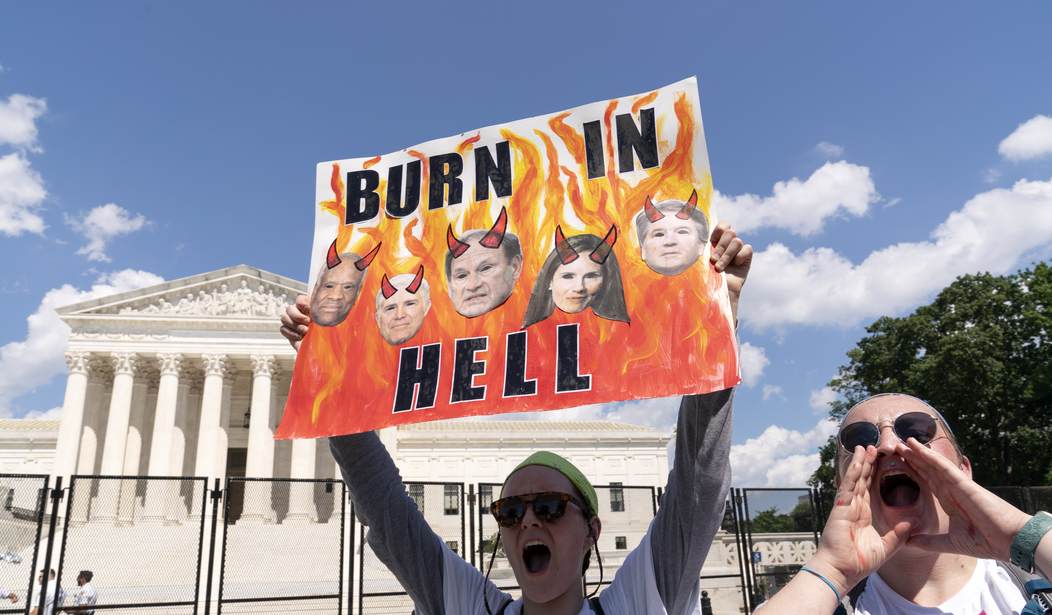These aren’t the most interesting cases, but they’re essential, nonetheless. The latest case heading to the Supreme Court isn’t grounded in abortion rights, which was the main attraction for the high court this past summer after a draft of the Dobbs opinion was leaked to the press. It set off a flurry of protests, demonstrations outside the homes of the justices, and even assassination attempts. Dobbs overturned Roe v. Wade, which led to a litany of hyperbolic segments from the liberal media and left-wing activists about how this decision will kill scores of women. The post-apocalyptic anecdotes about young women and girls bleeding out in the streets from illegal abortions flooded the airwaves. It’s been over 100 days since Dobbs—there aren’t piles of dead ladies.
This upcoming issue before the court deals with redistricting and whether local courts can interfere. In July, The Week had an excellent summary of the Moore v. Harper case, whose writ of certiorari petition was granted last June for the upcoming October 2022-23 term. Oral arguments are set for December 7.
The legal beef that must be settled is whether it was constitutional for the North Carolina state Supreme Court to dismiss the latest redistricting map, which heavily favored Republicans. It’s a test of the “independent state legislature doctrine.” That legal position says that state/local courts cannot interfere in the redistricting process—the pickle here for those arguing in favor of the doctrine is that the Tar Heel state passed a law granting local courts the authority to review the maps. If successfully argued, critics warn that the “independent state legislature doctrine” could pave the way for single-party rule. Speaker of the North Carolina House of Representatives Tim Moore sued voter Rebecca Harper, leading us to this final legal showdown (via The Week):
According to The Carolina Journal, the case will test a legal theory known as the "independent state legislature doctrine," which asserts that "only the state legislature has the power to regulate federal elections, without interference from state courts."
Article I, Section 4 of the U.S. Constitution states that the "Times, Places, and Manner of holding Elections for Senators and Representatives, shall be prescribed in each State by the Legislature thereof." Proponents of the "independent state legislature doctrine" argue that this clause gives state legislatures the power to draw congressional districts, set rules for federal elections, and appoint presidential electors, and that state courts have no power to interfere — even if the legislature blatantly violates the state constitution.
Which, in this case, it totally did. The North Carolina Supreme Court ruled in February that the proposed map, which would have guaranteed Republicans easy wins in 10 of the state's 14 districts, was "unconstitutional beyond a reasonable doubt under the ... North Carolina Constitution."
The situation in North Carolina is not so clear-cut, however. Robert Barnes noted in The Washington Post that the state's General Assembly passed a law two decades ago empowering state courts to review electoral maps and even create their own "interim districting plan[s]." Moore's lawyers must therefore prove that the legislature violated the U.S. Constitution by abdicating its own authority over redistricting.
[…]
In January, Ryan Cooper wrote for The Week that the state of Wisconsin "effectively exists under one-party rule." Democrats can still win statewide elections — say, for governor or U.S. Senate — but state legislative districts are hopelessly gerrymandered in favor of Republicans. If the Supreme Court sides with Moore, GOP-controlled legislatures in states like Wisconsin would have full authority to rig not only their own states' legislative elections, but elections to the U.S. House of Representatives as well.
[…]
The Electoral Count Act of 1887 stipulates that each state's slate of electors must be certified by the governor of that state. In states like Wisconsin— which has a Democratic governor — this law could prevent the Republican-led legislature from handing the state's electoral votes to a losing Republican candidate.
But wait — if the independent state legislature doctrine is correct, then the governor has no right to usurp the legislature's constitutionally granted powers. That provision of the Electoral Count Act (ECA) would be struck down.
Recommended
The publication added that Chief Justice John Roberts, who has given conservatives nothing but heartburn over the past few years, could side with Moore’s arguments. It’s quite the coup since Roberts is now viewed on the Right as the emerging face of the liberal wing of the Supreme Court upon the passing of Ruth Bader Ginsburg.
























Join the conversation as a VIP Member